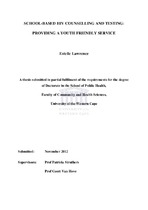| dc.description.abstract | HIV counselling and testing (HCT) is an essential element in the response to the HIV epidemic. There are still major gaps in research about the best ways to provide HCT, especially to young people. School-based HCT is a model which has been suggested for providing HCT to young people in a youth friendly manner. This study was aimed at producing recommendations for providing a youth friendly school-based HCT service using the World Health Organisation (WHO) framework for youth friendly health services. It was conducted in six secondary schools in Cape Town, where a mobile HCT service is provided by a nongovernmental organisation (NGO). It was an exploratory descriptive study, using a mixed-methods approach. Twelve focus group discussions (FGDs) were held with learners to explore their needs with regards to school-based HCT. An evaluation (which consisted of observation of the HCT site, service provider interviews and direct observation of the HCT counselling process) was done to determine whether the mobile school-based HCT service was youth friendly. A learner survey was conducted with 529 learners to investigate the factors that influence the uptake of HCT and to explore learners’ behaviours and experiences under test conditions. In the FGDs, learners said that they wanted HCT to be provided in schools on condition that their fears and expressed needs were taken into account. They wanted their concerns regarding privacy and confidentiality addressed; they wanted to be provided with information regarding the benefits and procedure of HCT before testing took place; they wanted service providers to be competent to work with young people, and they wanted to be assured that those who tested positive were followed up and supported. On evaluation of the mobile school-based HCT service, it was evident that the service did not meet all the needs of the learners nor did it have all the characteristics of a youth friendly health service. The model of ‘mass testing’ used by the NGO did not fulfil learners’ expressed need for privacy with regards to HCT. Service providers were friendly and non-judgemental but had not been trained to work with young people (especially marginalised groups e.g. young men who have sex with men). The information needs of learners were not addressed, and learners were not involved in the provision of the HCT service. Learners who tested positive were not assisted in accessing care and support. The learner survey revealed a high uptake of HCT (71% of learners) at schools with learners who do not identify themselves as Black, with female learners and older learners being more likely to have had an HIV test. Factors that influenced uptake of HCT were complex, with learners reporting many different motivators and barriers to testing. Of concern was the low risk perception of leaners with regards to HIV infection and the fact that learners who tested HIV positive were not being linked up with treatment and care. Based on the findings of the study, recommendations were made for providing youth friendly school based HCT. A multisectoral approach, with learner and community involvement, was suggested in order to provide a service which is equitable, accessible, acceptable, appropriate and effective. | en_US |

